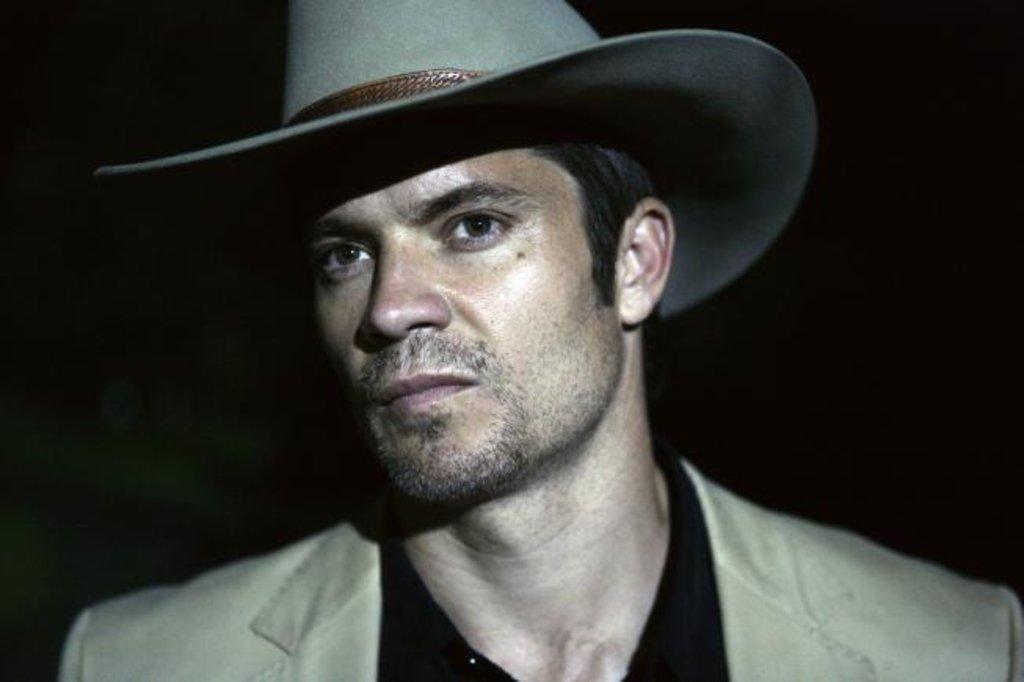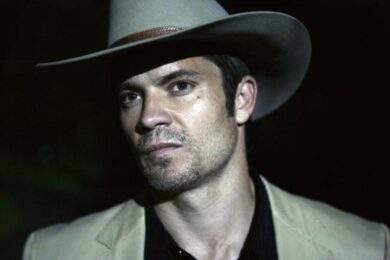In his 1968 film Coogan’s Bluff, Clint Eastwood plays a rural Arizona sheriff at odds with the pace and sophistication of big city life when he’s despatched to Manhattan on the trail of a murderer. A similar fish-out-of-water premise inspired the long-running TV series McCloud two years later, this time with Dennis Weaver as a small town lawman in a cowboy hat bringing traditional western values to the vast metropolis.
Justified, shown in Britain on Five USA in the summer and out now on DVD, turns the idea on its head. Kentucky-born US marshal Raylan Givens (Timothy Olyphant) is totally at ease dispensing tough justice to the drugs barons and low-lives of busy Miami ("a sunny place for shady people," as he puts it), but when he guns down a suspect in broad daylight his bosses play politics and reassign him back to the hick state he’d hoped he’d left behind for good.
That’s the first few scenes of the pilot taken care of, and what follows are 13 episodes of a brilliantly-plotted redneck noir, rich in three-dimensional characters delivering the whip-smart dialogue relished by readers of Elmore Leonard’s stories. Cinema has had a stuttering relationship with the Leonard ouevre (see below), each successful adaptation counter-balanced by a forgettable misfire, but it’s television that has arguably delivered the most perfect distillation of the writer’s strong-willed heroes, complicated women and enigmatic villains.
This is the third attempt at transferring Leonard’s work to the small screen in the last dozen years, but the first to be given a second series, due to start filming in early 2011. Maximum Bob (1998) starred Beau Bridges as the ultra-right-wing southern judge of the title in a snappy comedy-drama, which, despite its initial promise and positive reviews, was cancelled by ABC after just seven episodes because of poor ratings, while Karen Sisco (2003), with Carla Gugino as the US marshal earlier portrayed by Jennifer Lopez in Out Of Sight, scraped to double figures before the same network pulled the plug.
What’s clearly strengthened Justified‘s hand is not only a more daring and adventurous US broadcaster, FX (which also gave UK premieres to The Wire, Dexter, True Blood and The Walking Dead), but the fact that Leonard himself is listed as executive producer and has chosen to become more involved in the transition from page to screen than at any other time in his lengthy career. It was Leonard who first approached show chief Graham Yost with the idea of making a TV series based on his 2001 short story ‘Fire In The Hole’.
The Givens character had previously appeared in two mid-90s Leonard novels, Pronto and Riding The Rap, but the author felt the starting point of Fire In The Hole offered greater momentum and richer pickings for an episodic TV series. Though now based in Lexington, the state’s second-largest city, Raylan frequently finds himself in the Kentucky backwoods of Harlan County, his default-setting laconic cool challenged by run-ins with a jailbird father, a remarried ex-wife and, most significantly, a friend from his teen years who’s followed his extended family into a life of crime.
Any one of the first season episodes, packed with dry humour and never-saw-that-coming plot twists, can be viewed and enjoyed in isolation, but the underlying narrative arc of the series offers a slowburn insight into the relationship between Raylan and the wayward Boyd Crowder (Walton Goggins); buddies from when they worked the Kentucky coal mines together as younger men, but whose lives then followed divergent paths on either side of the law.
Olyphant is a savvy and stoic presence as Raylan, often in conflict with the by-the-book ideas of his superiors but never overplaying the "maverick" card the way most unconventional TV lawmen are prone to. Yet, as watchable and awards-worthy as his portrayal might be, it shifts up a further gear in the exchanges with Boyd. An electrifying turn by Goggins, he’s a swastika-tattooed white supremacist with a rocket launcher when we first meet him, but becomes a more curious and potentially chilling prospect after seemingly undergoing a religious conversion behind bars.
Both actors are singled out for praise by Leonard in an interview included in the DVD box set: "Over the years I’ve had at least 20 pictures made of my books, and there aren’t that many actors who deliver the lines the way I heard them when I wrote them." He also bigs up Yost and his team of writers: "They hit it right on the head, keeping the flavour of my writing."
Yost explains that what he finds most intriguing about Raylan Givens is that he combines two distinct aspects of Leonard’s output, a coming together of the author’s earlier western novels ("before they stopped being profitable") and his more celebrated crime fiction. Tellingly, he set up a mini-library in his office, a shelf containing all 44 of Leonard’s books for his writers to refer to for atmosphere and inspiration. He also gave each of them a wristband to wear on the first day of pre-production, bearing the initials WWED – "What Would Elmore Do?"
On paper, Justified is the least Leonard-like of yarns, far removed from the Miami or Detroit of the bulk of his writing, but the rural setting is almost a character in itself. Not much appears to have changed in Kentucky over the last 100 years; familial feuds, poverty, desperation, revenge and the sense of a region overlooked by industrial growth or commercial promise seep through each frame, the main difference perhaps being that the moonshiners of yore have given way to descendants running meth labs out of battered trailers in the woods.
Whether Leonard or Yost will further examine this element of the story remains to be seen, but at least there will be a second series in which to find out. The plaudits for an intelligent and only slightly off-the-wall crime drama are, like Raylan’s capping of a sleazy drug lord in the very first scene, totally justified.
The first season box set of Justified is out now Sony Pictures Home Entertainment
The Best And Worst Of Elmore Leonard At The Movies
Hombre (1967)
A so-so revisionist frontier tale starring Paul Newman as a white man raised by Apaches, its culture clashes not nearly as well-defined as in John Ford’s The Searchers a decade earlier, although it kick-started a mini-wave of films focusing on the erosion of the old west (Butch Cassidy, The Wild Bunch, Pat Garrett & Billy The Kid). Leonard’s original book, published in 1961, is perhaps the most celebrated of his western novels.
Mr Majestyk (1974)
Although Leonard himself wrote the screenplay based on his own novel of a battle-weary Vietnam vet turned farmer up against ruthless mob types, the book’s political sub-plots of exploited migrant workers and pacifism were all but jettisoned for the movie version, leaving us with little more than a by-the-numbers Charles Bronson vehicle, interchangable with any one of a half dozen titles in the wooden thesp’s early 70s CV.
Stick (1985)
Directed by and starring Burt Reynolds, and another example of the colour and brio of Leonard’s writing being skinned to the bone to make a bog standard action vehicle for its leading man. Reynolds is the titular ex-con on a mission to track down the gang who killed his best buddy, portrayed as a more heroic and likeable central character than suggested by Elmore’s book.
52 Pick-Up (1986)
Director John Frankenheimer is a dab hand at action, but chose to dispense with practically all the character and humour in Leonard’s original novel, published in 1974. Instead, he goes for the jugular, focusing on the violence of a shady crew blackmailing politician’s husband Roy Scheider, caught on camera in a bout of extra-marital how’s-your-father. This was the second screen adaptation of the book, following 1984’s more politically-slanted (and equally disappointing) The Ambassador.
Get Shorty (1995)
Still strutting on the career resuscitation of the previous year’s Pulp Fiction, John Travolta makes a perfect Leonard hero as Chilli Palmer, the mob loan collector with designs on becoming a movie producer. Scott Frank’s screenplay takes occasionally broad comic liberties with the source material, but stays true to much of its dialogue, with the likes of Gene Hackman, Dennis Farina and Danny DeVito getting just as many great lines as Travolta. The belated sequel Be Cool (2005) is best avoided, though.
Jackie Brown (1997)
Quentin Tarantino exhibited an admirable knack for Leonardesque dialogue in both Reservoir Dogs and Pulp Fiction, but was arguably more restrained when adapting the great man’s novel Rum Punch for his third film as a director. Less showy than its predecessors, Jackie Brown is more of a character-driven piece, with fine work by Pam Grier in the title role (who was white in Leonard’s original book) and Robert Forster as a sympathetic middle-aged bail bondsman. Top turns by Robert De Niro and Samuel L Jackson, too.
Out Of Sight (1998)
Perhaps the snappiest and coolest big screen adaptation of Leonard’s work, even more so than Get Shorty, with whom it shares a screenwriter, Scott Frank. Director Steven Soderbergh riffs his way through the star-crossed romance of conman George Clooney and federal marshal Jennifer Lopez and delivers humour and action in spades. Again, Frank stays close to the original book, allowing supporting players Albert Brooks, Ving Rhames and, once more, Dennis Farina their moments to shine.
The Big Bounce (2004)
Director George Armitage confidently welded the crime caper to a romantic comedy in Grosse Point Blank a few years earlier, but becomes unstuck when attempting to give Leonard’s hard-boiled novel the same treatment. Owen Wilson is little more than a mugging annoyance as the small time thief seduced into making a big score by Sara Foster’s bikini-clad femme fatale (an overly sweetened version of the super bitch in Leonard’s book), their sappy sparring placed centre-stage and swallowing up screen time that could have gone to more interesting supporting characters (Morgan Freeman, Bebe Neuwirth).
3:10 To Yuma (2007)
A remake of the Glenn Ford western a half century earlier, itself based on a 1951 Leonard short story, director James Mangold’s update is rightly considered one of the best westerns of recent times. As with Hombre, the film’s revisionist themes cover moral ambiguity and a vanishing way of life, with Mangold forsaking modern cinematic tricks for a more straight-forward narrative that comes across as a solid homage to the roots of the genre. Christian Bale and Russell Crowe are suitably steely-eyed and brooding, but it’s Ben Foster’s turn as Crowe’s psychotic sidekick that makes the biggest impression.
Killshot (2009)
Oscar-nominated director John Madden (Shakespeare In Love) cut his teeth on small screen crime drama (Prime Suspect, Inspector Morse), but his return to the underworld takes itself far too seriously, all but ignoring the vigour and wit of Leonard’s book, published 20 years earlier. Estate agent Diane Lane and her husband are bundled into the witness protection programme after stumbling on a hitman at work (Mickey Rourke), leading to a series of pedestrian gunfights and explosions, punctuated by soap opera seriousness hammy acting.



